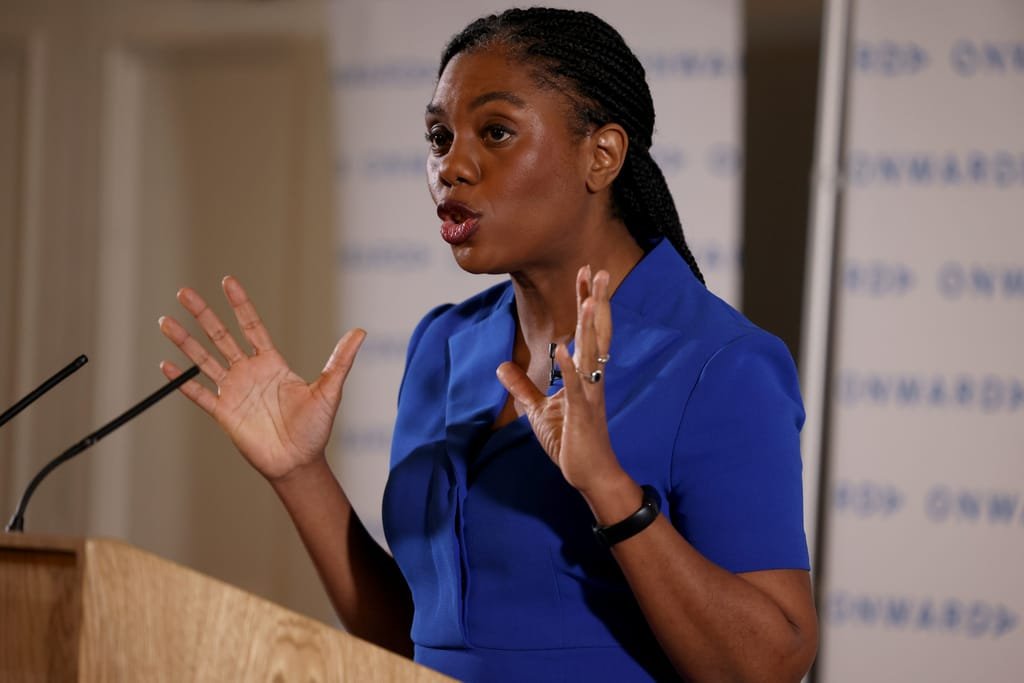Taken over as the leader of a wounded political party? Try some self-flagellation.

LONDON — Sorry seems to be the easiest word.
Conservative Leader Kemi Badenoch is on an apology tour Wednesday as she seeks to explain why her party plummeted to an historic election loss last July and rebuild trust with British voters.
While tearing chunks out of Labour, Badenoch lambasted her party for failing to come up with a coherent plan for economic growth after Brexit, making a legal commitment to a net zero emissions target by 2050 without explaining how they’d do it, and dropping the ball on migration.
It’s a big moment for Badenoch as she looks to steady the ship. But she’s not the first U.K. political leader to try and move on — by burying the recent past.
2006: David Cameron sorry for Tory EU obsession
Taking the reins shortly after his Conservative party failed to make a dent in Tony Blair’s majority at the 2005 election, David Cameron’s smooth-talking, energetic style had Tories long in the doldrums hoping for a savior.
But Cameron’s first conference speech as leader went far beyond style, offering both an apology and a frank autopsy of his party’s failings.
He lambasted them for talking about their own hobby horses rather than the people’s priorities, pressing for tax cuts rather than economic stability, and pushing selective grammar schools over broader educational standards.
But his speech is best remembered for his line that, instead of talking about the childcare squeeze, the Tories had spent too long “banging on about Europe.”

That famous line did, for a short time, seem to quiet Eurosceptic feuding and allow the Tories to rebuild into an election-winning machine.
But given David Cameron is now best known as the Prime Minister who presided over Brexit, you have to wonder, where did it all go wrong?
2010: Ed Miliband sorry for the Iraq war
When Cameron swept into Downing Street in 2010, it was Labour’s turn for a post-mortem on their election failings.
New leader Ed Miliband, from the party’s soft left, was frank in his analysis. It was in large part, about Iraq.
The 2003 Labour-backed invasion, Miliband told his party faithful, had led to a “fundamental loss of trust” and it was “right to level with people” about it.

Branding Tony Blair’s decision to take Britain to war as “wrong”, Miliband also offered a eyebrow-raising excuse for his own lack of criticism when in government, saying he was bound by the “collective responsibility” principle that stops members of the government from openly hitting out at decisions made around the cabinet table.
His analysis went down well with members listening to his keynote conference speech, but led to some awkward scenes as senior members of his party were captured on camera refusing to applaud along.
Former cabinet minister Harriet Harman did join in with the applause, only to be castigated by Miliband’s brother (and defeated leadership rival) David, who leaned in to her and said: “You voted for it, why are you clapping?” Hardly the best start.
2016: Jeremy Corbyn really, really sorry for the Iraq war
When veteran left-wing MP Jeremy Corbyn sensationally won the Labour leadership in 2016, he had plenty to say about the reasons for its spate of election defeats and how to put things right.
He accused the Westminster establishment of being out-of-touch with young people, slammed the “intrusive” and “abusive” media, and suggested his party had abandoned its core supporters.
But Corbyn also made the promise of further apologies for Iraq a key promise in his leadership bid — which he delivered on repeatedly.

The time for an apology on behalf of the Labour Party was “past time,” the veteran anti-interventionist later stated. The U.K.’s involvement was, he said, based on “deception,” with MPs “misled” by the governmental top brass.
Like his predecessor, Corbyn hoped setting the record straight would encourage disillusioned voters — particularly young people — to return to his party, even if it meant some short-term anger from the right.
2020: Keir Starmer sorry for Corbyn
Corbyn’s initial popularity failed to transform his party’s election record, with the left-wing leader presiding over an underwhelming result in 2017 and a brutal election drubbing in 2019.
Tasked with turning around their fortunes, newly-elected Labour leader Keir Starmer was quick to offer a diagnosis. Corbyn had been their biggest problem.
In his first conference speech as leader, Starmer didn’t mention his predecessor by name, but the message came across loud and clear.
“It’s time to get serious about winning,” he said. “This is a party under new leadership.”
Starmer continued his dismantling of Corbyn’s record by deriding his claim that while Labour had lost the election they had “won the arguments.”
“Let’s be blunt,” he fired back. “Let’s be brutally honest with ourselves. When you lose an election in a democracy, you deserve to.”
And beyond Corbyn’s policy priorities, the new Labour leader was keen to hammer home his view about the corrosive impact that allegations of anti-semitism had had on Labour’s election result.
Opting to be introduced by Jewish former Labour MP Ruth Smeeth, Starmer’s less-than-subtle message was hammered home before he even uttered a word.

“As I promised on my first day as leader we will root out the anti-semitism that has infected our party,” he said in his opening remarks. “We’re making progress — and we will root it out, once and for all.”
Given Starmer’s historic election victory last year, Badenoch’s team might feel the man they want to replace was on to something.
2019: Jo Swinson sorry for … everything
As leader of Westminster’s fourth-largest party when the 2019 election was called, Liberal Democrat MP Jo Swinson raised plenty of eyebrows when she talked up her chances during the campaign of being the next British prime minister
But while initially viewed as a sign of confidence in their ability to seize on anti-Brexit sentiment, the PM-in-waiting gimmick soon morphed into utter delusion among elements of the party who appeared genuinely convinced they were destined for a historic victory.
With resources diverted toward clearly unwinnable seats, election night brought humiliation for the party as their clutch of 12 seats dropped to 11. Rather than walking into Downing Street as the next Prime Minister, Jo Swinson walked out of the East Dunbartonshire sports hall where her votes were counted, unemployed.

While Swinson said she was “so sorry” for the result, she insisted she did not “regret” being the “unapologetic voice” of anti-Brexit sentiment during the campaign, instead attacking her opponents for dodging media scrutiny and allowing racism to fester.
It was an unusually defiant speech given the disastrous result, and served as proof to party insiders that Swinson refused to buy into the old adage: Pride comes before a fall.
That fall would come just months later when an internal party review branded the campaign she led as a “high-speed car crash.”




